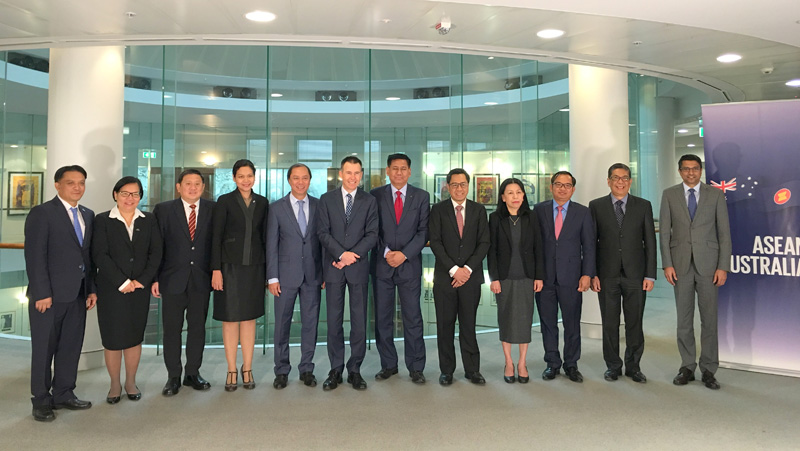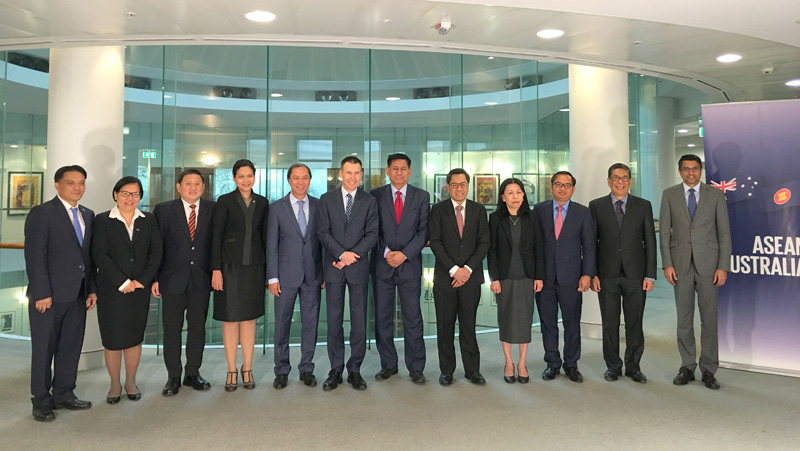



|
Deputy Foreign Minister Nguyen Quoc Dung (fifth from left) and delegates pose for a joint photo at the forum (Photo: MOFA) Speaking highly of the important results of the ASEAN-Australia
Special Summit, Deputy FM Dung underscored the importance of connectivity
within ASEAN, and between ASEAN and broader regions, as well as the
significance of the Greater Mekong Sub-region (GMS)’s strategy to ASEAN
development.
He shared the bloc’s priority orientations and encouraged
Australian government and firms to actively assist ASEAN in promoting hard
and soft infrastructure connectivity in the region and the GMS.
On regional and global issues, he expressed his wish that ASEAN
and Australia would enhance effective collaboration in ASEAN-chaired
frameworks and forums, towards building an open, transparent and rules-based
regional architecture.
The Deputy FM took note of ASEAN’s consistent stance on the East
Sea issue that was reaffirmed by their leaders during the 32nd ASEAN Summit.
He wished that Australia would continue upholding its active
role and make constructive and responsible contributions to dealing with
challenges to peace and stability in the region.
Australia affirmed ASEAN’s importance in its external policy and
supported the bloc’s central role in shaping an open, transparent and
rules-based regional architecture. The country wished to continue stepping up
economic connectivity and openness in the region.
Amid rapid and unpredictable developments in the region,
Australian officials said ASEAN plays an important role as a strategic
organiser in forums and mechanisms for the sake of regional peace, security
and stability.
The Pacific nation vowed to continue effective engagement in and
active contributions to mechanisms such as the East Asia Summit, the ASEAN
Regional Forum, and the ASEAN Defence Ministers’ Meeting Plus. It expressed
support to ASEAN’s 2018 theme of facilitating self-resilience and innovation,
including building smart cities.
Both sides discussed issues related to the Korean Peninsula, the
East Sea and Rakhine state in Myanmar and other trans-national security
challenges.
Expressing concern over recent militarisation in the East Sea,
they highlighted the importance of maintaining peace, security, stability,
peaceful settlement of issues in line with international law, step up
dialogues, build trust and strive to reach an effective and legally-binding
Code of Conduct in the East Sea (COC).
On future orientations, they agreed to foster coordination
across the pillars of politics-security, economy-trade-investment,
socio-culture and people-to-people exchange.
On the basis of common vision and 15 cooperation initiatives as
agreed by leaders at the ASEAN-Australia Special Summit, the two sides vowed
to launch specific joint work in the fields of trade, investment,
connectivity, infrastructure, creativity and innovation, education-training,
gender equality, terrorism and violent extremism prevention, cyber security,
trans-national crimes and marine cooperation.
In the near future, they will specify initiatives such as
ASEAN-Australia infrastructure and GMS development, maritime cooperation,
business connectivity via the ASEAN-Australia Chamber of Commerce and the
ASEAN-Australia Business Council.
They will also hold seminars on women and youths’ role in
security and development, offer 50 scholarships to ASEAN students in 2019,
realise cultural diplomacy initiative 2019, conduct sport exchanges and soon
conclude negotiations on the Regional Comprehensive Economic Partnership
(RCEP) and ratify the Comprehensive and Progressive Agreement on
Trans-Pacific Partnership (CPTPP).
|
Source: NDO